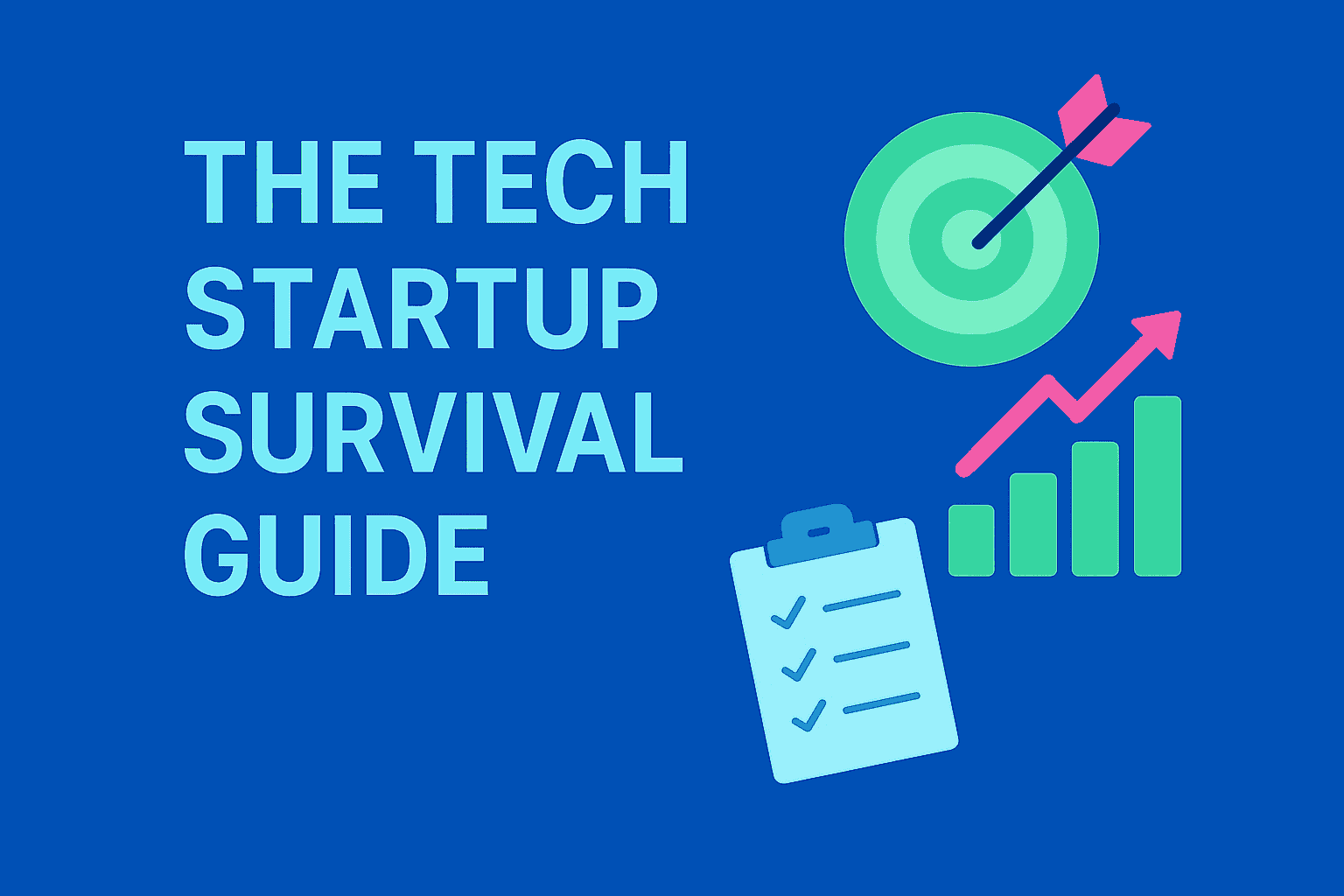Top 4 Ways to Overcome Your Startup’s Operational Hurdles…
For B2B tech startup founders, operational challenges are inevitable. While technology is at the heart of your innovation, the path to growth is riddled with obstacles, particularly in the most important functions of your business: marketing and sales. Success doesn’t just hinge on the product or service you offer but also on how well you can overcome these hurdles. Preparation for the inevitable challenges ahead will stand you in good stead. The most important thing for any startup to do is marketing and the hardest thing is selling to other organisations, so here are some actionable strategies to help navigate the turbulent operational waters of startup life.

1. Building and Scaling a Sales Engine
Sales are the lifeblood of any startup, but creating a scalable sales model is a formidable challenge. Unlike consumer-facing startups, where sales cycles are shorter and decision-making is often impulsive, B2B tech startups face longer sales cycles, complex decision-making processes and the need to convince multiple stakeholders.
Challenge 1: Lengthy Sales Cycles
One of the first hurdles startups face is the extended sales cycle inherent in the B2B sector. Sales to enterprise clients can take months, even years, to close. This can put pressure on cash flow and make forecasting difficult. To address this challenge, startups must refine their lead qualification process. Focusing on quality leads rather than quantity ensures that resources are allocated to prospects that are most likely to convert.
Solution
Implement account-based marketing (ABM) strategies to target high-value accounts with personalised marketing and sales efforts. This strategy aligns sales and marketing teams to ensure a focused and efficient approach. HubSpot research shows that ABM drives higher return on investment (ROI) compared to traditional marketing approaches, making it ideal for startups with limited resources.
Challenge 2: Building a Sales Team
Hiring a high-performing sales team is another challenge. Many founders make the mistake of hiring too many salespeople too early, and before they fully understand their customer base and value proposition. Rushing into sales hires can lead to misalignment between the product and market needs, resulting in costly errors.
Solution
In the early stages, sales must be a founder-led activity. Founders must be actively involved in the sales process and part of a small sales team. This helps them gain direct feedback from customers, understand pain points and refine the pitch. Once the product-market fit is established, hiring more experienced salespeople, who understand the complexities of B2B tech sales, is crucial for scaling.
2. Marketing – Fuelling the Rocket Ship
Marketing is the most significant challenge, especially in crowded markets. With limited budgets and resources, startups must be highly strategic in how they allocate marketing spend, if they are lucky enough to have any.
Challenge 1: Lack of Brand Awareness
One of the imperatives for B2B tech startups is building brand awareness. With a limited marketing budget, marketers can struggle to get the brand in front of the right people. Competing with established players in the industry can feel overwhelming, especially when you’re up against companies with deep pockets. This challenge is one of the most exhilarating for marketers to embrace, and it’s one of the reasons why I love this profession so much. Competing and winning against the odds is the reward that makes this career worth pursuing.
Solution
Focus on inbound marketing to attract leads by creating informative content that has a high perceived value, as it addresses the pain points of your target audience. Investing in quality content, such as videos, is good but can be expensive. If that option is not available, then there are other forms of quality content you can focus on that are less expensive to produce, such as blog posts, white papers and case studies. The purpose is to establish your company and its spokespeople as thought leaders in what you do. Startups can also leverage social media platforms like LinkedIn to engage directly with decision-makers.
Challenge 2: Misaligned Messaging
A common mistake by B2B tech startups is misaligned messaging. Founders, often being product-focused, tend to emphasise features, product names and technologies rather than benefits and outcomes. However, customers care more about the problems your product solves than the technical specifications.
Solution
Start with clear, customer-centric messaging that talks about the value your product brings to businesses like theirs. Incorporate customer testimonials from similar organisations they will recognise, and give example use cases that demonstrate real-world impact and results. Conduct customer interviews to gain insights into their needs and pain points and adjust your messaging accordingly. If a customer buys your solution, what will they be able to do tomorrow that they couldn’t do yesterday? Answering this question helps you create a value proposition that resonates with your target audience.
3. Operational Efficiency: Process and Structure Matter
Operational efficiency is key for any startup, but is particularly important for B2B tech startups, where sales cycles can be long and customer acquisition costs can be high.
Challenge 1: Scaling Too Quickly
Many startups fall into the trap of scaling too quickly without a solid operational foundation. This can lead to inefficiencies, burnout and ultimately failure. Rapid growth without the necessary processes in place to support it can cause chaos within the organisation, leading to missed opportunities and dissatisfied customers.
Solution
Before scaling, ensure that internal processes are well understood and streamlined. Automate repetitive tasks where possible, such as lead tracking, follow-ups and reporting using CRM software. According to Salesforce, companies that use CRMs see a 29% increase in sales and a 34% increase in sales productivity. Establish clear roles and responsibilities within your team to prevent overlaps and confusion.
Challenge 2: Founder Burnout
Founders often wear multiple hats, juggling sales, marketing, product development and operations. This can lead to burnout, which negatively impacts the startup’s growth. Founders must learn to delegate tasks and trust their team to execute their vision.
Solution
Building a strong leadership team is essential. Founders must focus on hiring experienced leaders in marketing, sales and operations who can take ownership of their respective areas. According to Harvard Business Review, companies with strong leadership teams are 13 times more likely to outperform their competition.
4. The Cash Crunch: Balancing Growth and Sustainability
Cash flow is a constant concern for startups, and managing it effectively is key to surviving and growing. Without careful planning, it’s easy for startups to burn through their runway without achieving key milestones.
Challenge 1: Running Out of Cash
The most common reason startups fail is running out of cash. Many founders underestimate how much capital is needed to reach profitability, especially in B2B tech, where sales cycles are long and customer acquisition costs are high. Hiring ahead of building revenue is a very dangerous game.
Solution
Founders must maintain a keen focus on cash flow management and prioritise recurring revenue models like SaaS, which provide a steady stream of income. Startups should also seek out strategic partnerships to share resources and costs. According to CB Insights, 29% of startups that fail cite running out of cash as the main reason, underscoring the importance of careful financial planning. Balancing costs and revenue must be the priority.
Challenge 2: Securing Investment
Securing funding can be a major hurdle, especially for startups in niche markets. Investors want to see traction, but without capital it can be hard to generate the sales needed to prove market demand. Scaling a business is expensive and many startups will struggle if unable to adequately fund their growth.
Solution
Focus on building a strong customer base before seeking investment. Demonstrating product-market fit and customer retention is more attractive to investors than simply having a great idea and a product in development. Consider bootstrapping or seeking out non-dilutive funding options to maintain control over the company’s direction until you have an established business with solid revenues.
Planning, Focus and Adaptability are Key
The journey of a B2B tech startup is plagued with constant challenges, but with the right strategy, focus and adaptability, survival is possible. Marketing and sales are the critical engines that drive growth and must be prioritised with resources, followed by careful planning, alignment and execution. By building a scalable marketing and sales operation, with a focused strategy and maintaining operational efficiency, your startup can mitigate many of the typical growing pains and increase the chances of success. The road ahead may be bumpy, but with the right approach, focus and persistence, it is possible to grow and build a sustainable business.
You may want to read: “5 Step Guide to Crafting Your Problem Statement.”






